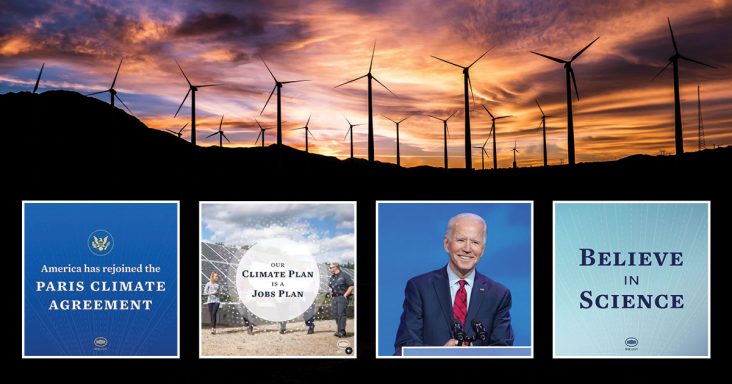What President Joe Biden’s climate goals mean for Arkansas’ energy sector
by February 21, 2021 11:47 am 3,684 views

President Joe Biden recently took action on energy-related policies to address climate change while seeking to restore scientific integrity across the federal government. An Arkansas energy leader sees his actions as ambitious with aggressive targets, but a state environmental group director said they are what science demands.
Glen Hooks, director of the Arkansas Sierra Club, said President Biden’s recent executive orders taking on climate change are “important first steps following four years of reckless, anti-environmental actions.”
Stephanie Osborne, executive director for Arkansas Advanced Energy Association, applauded Biden’s ambition to achieve a carbon pollution-free power sector by 2035 and a net-zero U.S. economy by 2050.
“Those are fairly aggressive targets that will require significant buy-in and technological advances to achieve,” Osborne said. “But better to swing for the fences than not try. It is certainly an important enough issue.”
Along with these goals in Biden’s orders was a directive to protect scientists from political interference and ensure they can think, research and speak freely.
“I appreciate his dedication to science and facts while promoting American businesses and technological developments to achieve his climate change goals,” Osborne said. “We are all in this together, and I think his approach shows that.”
Biden’s orders included broad goals, such as reducing short-term global emissions and reaching net-zero global emissions by mid-century or before. Biden also paused issuing new leases for oil and natural gas production on public lands and offshore waters and sought review of all existing leasing and permitting practices for fossil fuel development on the lands and waters. He will also look to double renewable energy production from offshore wind by 2030 and eliminate fossil fuel subsidies as the law allows.
These actions followed those Biden took on his first day in office, including rejoining the Paris Agreement and reviewing the rollbacks in standards that protect air, water and communities.
“Biden campaigned on climate issues and delivered quickly, but the biggest and most important work lies ahead,” Hooks said. “Congress must pass strong legislation in support of the president’s climate goals, which will send a clear message domestically and abroad that the United States is again a leader in scaling up technology that’s already available and affordable to mitigate the impacts of the changing crisis.”
Hooks said Biden’s goals would be more achievable with congressional help.

“We need to see comprehensive legislation that puts a price on carbon, supports communities impacted by generations of environmental injustices and puts people back to work in growing industries like wind, solar and energy efficiency,” he said. “Over the last decade, solar costs have dropped 90%, and wind has dropped 70% while solar installer and wind energy technician [occupations] have become good-paying green-collar jobs. Biden can make massive strides in growing our economy and addressing climate change. Congressional action would ensure our country moves at the speed and scale that science demands.”
‘WHAT SCIENCE DEMANDS’
Asked how ambitious Biden’s goals are, Hooks said, “it’s not about an ambition but rather what science demands. It’s that simple. And it’s the international consensus. It’s entirely achievable with political will and investment.”
Osborne said each morning, there is news of major companies and states pledging to become net-zero by 2050.
“This is a great first step,” Osborne said. “I would love to see Arkansas seriously consider its own carbon reduction goals. The state is already emerging as a solar energy leader and creating a regulatory environment compatible with reducing emissions while increasing jobs and opportunities. I think we could also lead in finding creative ways in reducing emissions. We are the natural state for a reason. We understand the value of protecting our beautiful environment while still finding ways to develop new technologies and encourage business growth in the state.”
Osborne expects specific sectors and areas of the country will meet Biden’s goals while others look to technological advances to make the reductions cost-effective.
“Making electricity, in particular, more expensive or unreliable in the quest to meet an artificially set year goal is not the purpose here,” Osborne said. “The purpose is to set the United States on an irreversible path that benefits our environment, our energy security, our economy and the American people.”
CLEAN ENERGY PLANS
In response to an inquiry about Biden’s policies and their impact on the energy sector, Peter Main, spokesman for Southwestern Electric Power Co. (SWEPCO), a utility of Columbus, Ohio-based American Electric Power, pointed to SWEPCO’s current plans to invest in clean energy and retire coal plants.
SWEPCO will add 810 megawatts of wind energy to its electricity generation portfolio when it acquires three wind farms in Oklahoma that are expected to be completed in 2021 and 2022.
This year, SWEPCO will retire the lignite-fueled Dolet Hills Power Plant in Louisiana, Main said. The company owns 257 megawatts of its capacity. By 2023, it will retire the lignite-fueled Pirkey Plant and cease coal operations at the Welsh Power Plant by 2028. SWEPCO owns 580 megawatts at Pirkey and 1,053 megawatts at Welsh. Both of the plants are in Texas, and all three serve customers in its three-state territory, including Arkansas.
“SWEPCO will continue operation of the Flint Creek Power Plant in Gentry in compliance with recently revised environmental regulations,” Main said. “SWEPCO owns 50% (268 megawatts) of Flint Creek and operates the facility. Arkansas Electric Cooperative Corp. (AECC) owns 50% (268 megawatts).”
AECC spokesman Rob Roedel provided the following statement in response to an inquiry on Biden’s policies:
“Arkansas Electric Cooperative Corp. will continue to work in the best interest of our more than 500,000 member-owners to ensure that they have access to reliable, affordable electricity. As a not-for-profit generation and electric transmission cooperative, AECC provides wholesale power to 17 electric distribution cooperatives in 74 of Arkansas’ 75 counties. AECC has a diverse portfolio of generation resources and power purchase agreements. AECC is a member of both the Southwest Power Pool (SPP) and the Midcontinent Independent System Operator (MISO) regional transmission organizations.”
NEW LEASE HOLD
In Arkansas, land under lease for oil and gas production has been falling annually since 2005, and about 360,000 acres were under lease at the end of 2020, Hooks said.
According to federal documents, in December, the Bureau of Land Management allowed the lease of 419 acres in Arkansas for oil and gas production. The acreage comprised five properties in Cleburne, Faulkner, Van Buren and Pope counties.
However, Biden has paused issuing new leases related to oil and natural gas production on public lands and offshore waters.
“This order just reinforces Biden’s approach: tipping the overturned scales in favor of oil and gas back to a level where renewable energy continues to fall in price and jump in capacity,” Hooks said. “This is the direction we need to go to prevent the worst effects of the climate crisis, and we can create millions of good-paying jobs doing so.”
Hooks also noted that the federal government provides the fossil fuel industry with up to $650 billion annually in subsidies. However, Biden can only control some of this. Congress allocates a majority of the subsidies.
“We’ve got enormous work to do to clean up the mess and get the country, and Arkansas, back on track and transitioning to clean energy,” Hooks said. “We have no time to waste.”
